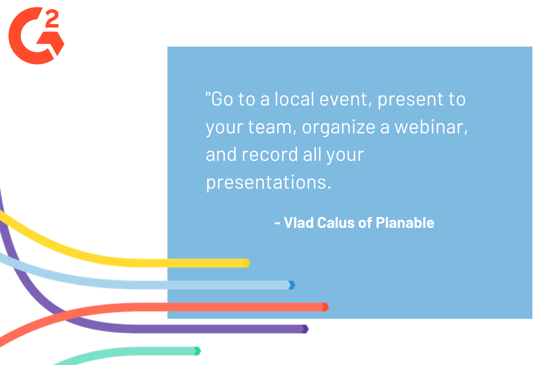We’ve all been told to imagine an audience in their underwear when feeling nervous for a speech.
If only it were that easy. It’s said over and over, but we all know it's not the best advice. No matter how hard we try to picture audience members like that, which is strange to begin with, it doesn’t negate the fact that we are still terrified to present information in front of a group of people and that public speaking is a key factor of professional development.
So here we are. Square one. No need to worry - we’ve compiled some tips that don’t involve nudity.
10 public speaking tips
To help relieve the jitters before and during your speech, we compiled a list of the ten best public speaking tips and even asked some experts how they overcome the fear of the dreaded public speaking experience.
How do you deal with public speaking anxiety?
- Practice
- Know your material
- Become familiar with your audience
- Get there early
- Test the equipment
- Pay attention to body language
- Be authentic
- Engage with your audience
- Nail your style
- Focus on your speed
Let's dive deeper into each of these tips.
1. Practice, practice, practice
This one has been said time and time again, but it’s more effective than picturing the audience in their underwear.
To reach peak preparation, practice as much as you can. Get a good final outline or draft of your speech and review it every day for at least a week before you present. Arguably the best thing about practicing a speech is that you can do it from just about anywhere - in the car, on the treadmill, or while waiting in line at the grocery store.
Practice in front of coworkers and friends, and even record yourself presenting your speech. Vlad Calus of Planable, a social media software management company, takes recording a step further.
“One thing that helped me a lot was shooting multiple LinkedIn videos. I started to be super active on LinkedIn and have published dozens of videos speaking on multiple topics. It helped me a lot with the way I speak, behave, and organize my talks.”


If you want to test your knowledge of the topic, try practicing with distractions. Turn the TV on or read over your speech in a noisy area. This way, distractions on stage won’t even matter.
2. Know your material
This one might seem obvious, but some people tend to dwell on other things like what they are going to wear and who is going to be in the audience. However, having a deep and thorough understanding of your material is the best way to deliver a memorable and informative speech that feels natural for the presenter. Should you stumble and lose your place in your speech, recovery is no problem.
|
Tip: After you've practiced, consider using speech analytics software to evaluate your emotions and get performance insights.

|
3. Become familiar with your audience
The fear of public speaking usually stems from the audience factor. To conquer this fear, do your best to understand them. Know who they are, why they are watching you speak, and what they are hoping to take away. Adjust the messaging and delivery depending on who you are speaking to. If you are a guest speaker at a professional conference, inspire them. If you are speaking in front of a group of friends, entertain them.
4. Get there early
Arriving to the venue early will not only give you more time to get comfortable with the environment, but it also allows you to interact with audience members.
“If you learn their name and role, it makes it easy to include someone in your talk when you need an example or volunteer,” says Connection Strategist Michelle Ngome.
Also, simply becoming acquainted with the audience members will help you envision them as someone you are comfortable speaking with, alleviating the nerves of presenting to a group of strangers.
5. Test the equipment
Alright. You know your speech like the back of your hand, you feel confident, and everybody is ready to listen. The last thing you want is to get up there and realize the microphone doesn’t work. It’ll ruin your mojo and keep everyone waiting.
Before you get up there, double and triple-check that the equipment is working and setting you up to deliver a killer presentation.
6. Pay attention to body language
The way he handle ourselves physically affects our message delivery almost as much as the words we speak. Krystal Covington, a Global Business Strategist, learned how important it is to pay close attention to the way we walk, stand, and speak.
“I learned to be attentive to my presence, which made me appear confident and polished, even when I felt less than great about my overall preparation level,” Covington admits.
This also includes making eye contact. Looking at audience members in the eye gives the presentation a conversational feel, making you and the audience feel more at ease.
7. Be authentic
We are all human, and humans have feelings. Get a good feel for the subject you are speaking on, and find room for emotion or humor (without making anyone feel uncomfortable). Making the audience feel something will leave more of an impact than informing them.
Also, don’t freeze if you stumble a bit. Robbin Block, a Creative Marketing Strategist at Blockbeta Marketing, stresses the importance of authenticity when speaking publicly.

8. Engage with the audience
Engaging with your audience will benefit its members and the presenter. Kristin Twiford of Libris points out the advantage engagement can provide and how to execute it.
“When I give talks at conferences, I always start with a question for the audience. It helps them feel engaged right from the start and helps me feel like we are having a conversation, and gives me a sense of who I am talking to,” she says.
9. Nail your style
Everyone has their own style of talking, and it is important to be true to it while making a speech. However, what is even more important is adapting that style to the topic at hand and the environment. Different events will require different tones and approaches, and having an adaptable delivery style will only make you a better public speaker.
10. Focus on your speed
When feeling nervous in front of a large audience, it is easy to start rambling and speaking fast. And you might not even notice. Talking too fast when making a speech shows how nervous you are and can result in the audience missing important information. Focus on your speed, more specifically talking slowly.
Nerves be gone
Still feeling a bit nervous after reading these tips? Good - that means you care about your speech, the information you are presenting, and the audience members listening. Eliminating pre-speech jitters altogether is no easy feat, but these tips will help you execute your presentation as close to perfect as possible.
Nervous about how you’ll look more than how you’ll sound? Learn more about nonverbal communication to look and sound your best while presenting.
.png) by Kevin Indig
by Kevin Indig
 by Deirdre O'Donoghue
by Deirdre O'Donoghue
 by Deirdre O'Donoghue
by Deirdre O'Donoghue